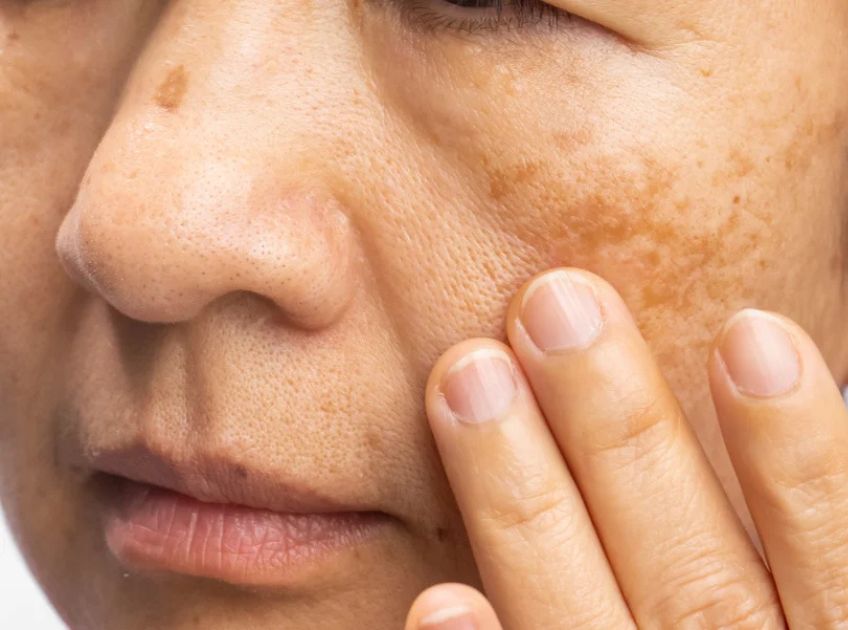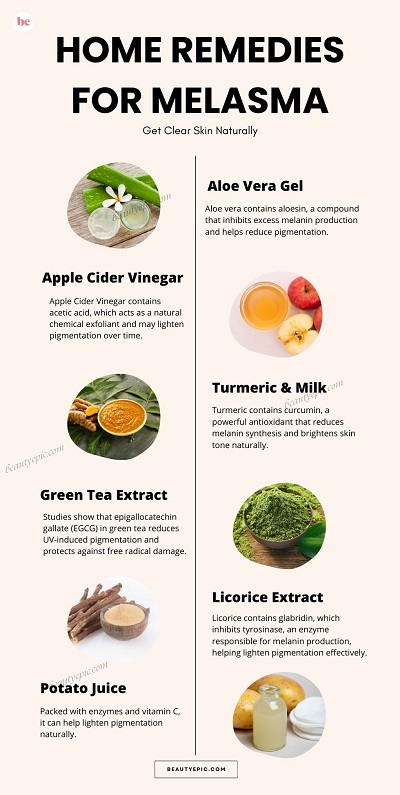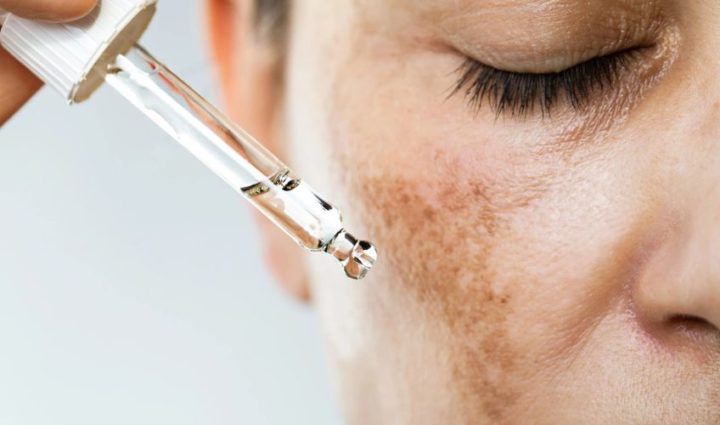
Important: This article is for informational purposes only. Please read our full disclaimer for more details.
Melasma is a common skin condition that causes brown or grayish patches on the face, especially on the cheeks, forehead, upper lip, and nose. It’s often triggered by sun exposure, hormonal changes, pregnancy, and genetics. While it’s harmless, it can affect your confidence and skin appearance.
The good news? You can lighten melasma naturally with simple home remedies while combining them with dermatologist-approved treatments for better results. In this guide, we’ll explore five effective home remedies, discuss medical options, and share science-backed insights for clearer, even-toned skin.
5 Effective Home Remedies for Melasma
1. Aloe Vera Gel for Skin Regeneration
Best for: Soothing and lightening hyperpigmentation
How to Use
- Apply fresh aloe vera gel directly to the affected areas.
- Leave it on for 20 minutes and rinse with lukewarm water.
- Use daily for best results.
Why It Works
Aloe vera contains aloesin, a compound that inhibits excess melanin production and helps reduce pigmentation.
2. Apple Cider Vinegar (ACV) for Natural Exfoliation
Best for: Fading dark patches and evening out skin tone
How to Use
- Mix 1 part ACV with 1 part water.
- Apply to melasma spots using a cotton ball.
- Leave for 2–3 minutes, then rinse thoroughly.
- Use 2–3 times a week only.
Why It Works
ACV contains acetic acid, which acts as a natural chemical exfoliant and may lighten pigmentation over time.
Pro Tip: Always patch test first — ACV can irritate sensitive skin.
3. Turmeric & Milk Brightening Pack
Best for: Reducing pigmentation and boosting radiance
How to Use
- Mix 1 teaspoon of turmeric with 2 tablespoons of milk.
- Apply evenly to melasma patches.
- Leave on for 15 minutes, then wash off with cool water.
- Repeat 2–3 times a week.
Why It Works
Turmeric contains curcumin, a powerful antioxidant that reduces melanin synthesis and brightens skin tone naturally.
4. Green Tea Extract for Antioxidant Protection
Best for: Preventing worsening pigmentation
How to Use
- Brew green tea, allow it to cool, and apply to affected areas with a cotton pad.
- Alternatively, use skincare products with green tea extract.
Why It Works
Studies show that epigallocatechin gallate (EGCG) in green tea reduces UV-induced pigmentation and protects against free radical damage.
5. Licorice Extract for Gentle Skin Lightening
Best for: Fading stubborn melasma patches
How to Use
- Apply skincare products containing licorice root extract directly on the dark spots.
- Use daily for best results.
Why It Works
Licorice contains glabridin, which inhibits tyrosinase, an enzyme responsible for melanin production, helping lighten pigmentation effectively.
Medical Treatments for Melasma
While home remedies can help manage mild melasma, persistent or severe cases often require dermatologist-recommended treatments:
- Topical creams: Hydroquinone, tretinoin, and corticosteroids reduce melanin production.
- Chemical peels: Glycolic acid and salicylic acid peels exfoliate pigmented skin layers.
- Laser therapy: Targets stubborn pigmentation for quicker results.
- Tranexamic acid: Taken orally or applied topically to manage hormonal melasma.
Tip: Always pair medical treatments with daily sunscreen to prevent worsening pigmentation.
Science Behind Melasma Remedies
Several studies support the effectiveness of natural and medical remedies:
- Aloe Vera: Research shows aloesin significantly reduces hyperpigmentation (Clinical and Experimental Dermatology) (1).
- Green Tea Extract: Proven to protect skin from UV-induced pigmentation (Journal of Cutaneous Medicine) (2).
- Licorice Root: Studies confirm glabridin as a safe and effective natural skin-lightening agent (Phytotherapy Research) (3)(4).
These findings show that combining natural remedies with dermatologist-approved treatments can deliver the best results.
Frequently Asked Questions (FAQ’S)
1. How long do home remedies take to show results?
Typically, 4–8 weeks of consistent use are needed to see visible improvements.2. Can melasma go away completely with home remedies?
Mild cases may fade significantly, but severe melasma often requires medical intervention for complete results.3. What precautions should I take while treating melasma?
- Always wear broad-spectrum sunscreen daily.
- Avoid harsh scrubbing or chemical products.
- Test home remedies on a small patch before applying to your face.
Final Thoughts
Melasma can be stubborn, but with consistent care, you can achieve brighter, even-toned skin. Start with natural remedies like aloe vera, turmeric, licorice extract, and green tea, and if needed, consult a dermatologist for advanced treatments.
Remember, the key to managing melasma is patience, sun protection, and gentle skincare. Over time, the right approach can help you regain your skin’s natural radiance.

















